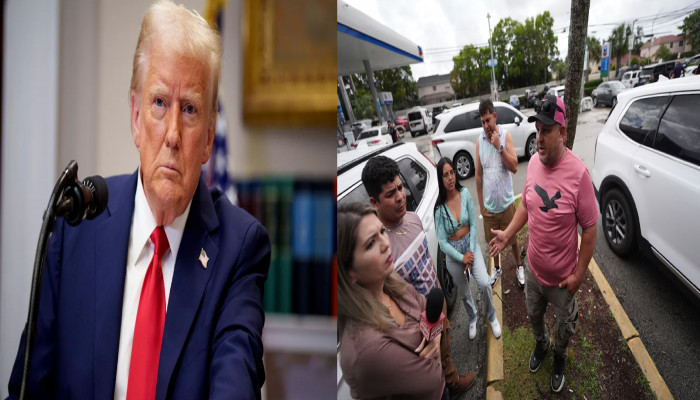Trump administration revokes temporary deportation protection for 350,000 Venezuelans
- In Reports
- 11:54 AM, Feb 04, 2025
- Myind Staff
The Trump administration is ending protections that kept around 350,000 Venezuelans from being deported, giving them just two months before they lose their right to work in the U.S. The decision issued by Homeland Security Secretary Kristi Noem impacts 348,202 Venezuelans who have Temporary Protected Status (TPS) in the United States and whose status is set to expire in April. That represents over half of the 600,000 people who are protected. The end of September marks the expiration of the remaining protections.
The notice of termination will become operative sixty days after it is published on Wednesday. It's one of the most recent moves by the Trump administration to attack the immigration system as officials attempt to fulfil pledges to crack down on those who are living in the country illegally and to implement the greatest mass deportation program in American history. In 1990, Congress established Temporary Protected Status (TPS) to stop the deportation of people from countries facing natural disasters or conflict. This program allows them to stay and work in the U.S. for up to 18 months at a time. Currently, about 1 million immigrants from 17 countries are protected under TPS, with Venezuelans being one of the largest groups benefiting from it.
The Department of Homeland Security concluded that Venezuela's situation had sufficiently improved to justify lifting its protected status. Additionally, according to Noem, the TPS designation has been used to grant immigration to those who would not otherwise have a chance to settle in the United States. According to the secretary's decision, "the sheer numbers have resulted in associated difficulties in local communities." She further mentioned that among those coming to the United States are members of the Venezuelan gang Tren de Aragua. The gang was founded over ten years ago in a chaotic prison in the central state of Aragua, but it has grown in size in recent years as millions of desperate Venezuelans have fled President Nicolás Maduro's regime and moved to the United States or other parts of Latin America.
During his campaign, Trump frequently spoke about the dangers of the gang, leading to criticism that he was portraying all immigrants as criminals. TPS (Temporary Protected Status) allows people to stay in the U.S. legally, but it does not offer a permanent path to citizenship. Their stay depends on the government renewing their status when it expires. Critics argue that these renewals often become automatic, regardless of conditions in the person's home country. Near the end of Biden’s presidency, Alejandro Mayorkas, who served before Noem, extended TPS protections for Venezuelans until October 2026. However, Noem reversed that decision. Deportation possibilities are limited because the United States and Venezuela do not have diplomatic ties. However, the Trump administration claims that securing deportations to Venezuela is now a major priority. Richard Grenell, his special missions envoy, visited Venezuela on Friday and spoke with Maduro. After the meeting, six U.S. inmates there were released.
After his visit, Trump posted on his social media platform, Truth Social, that Venezuela had agreed to accept their citizens back, which could help resolve the deportation issue. However, Venezuela's government has not yet confirmed that they will take back their citizens. During his first term, Trump attempted to terminate Temporary Protected Status for individuals from El Salvador, Haiti, Honduras, Nepal, Nicaragua and Sudan. Immigration advocacy organisations, however, filed a lawsuit to prevent the limits from being lifted.







Comments